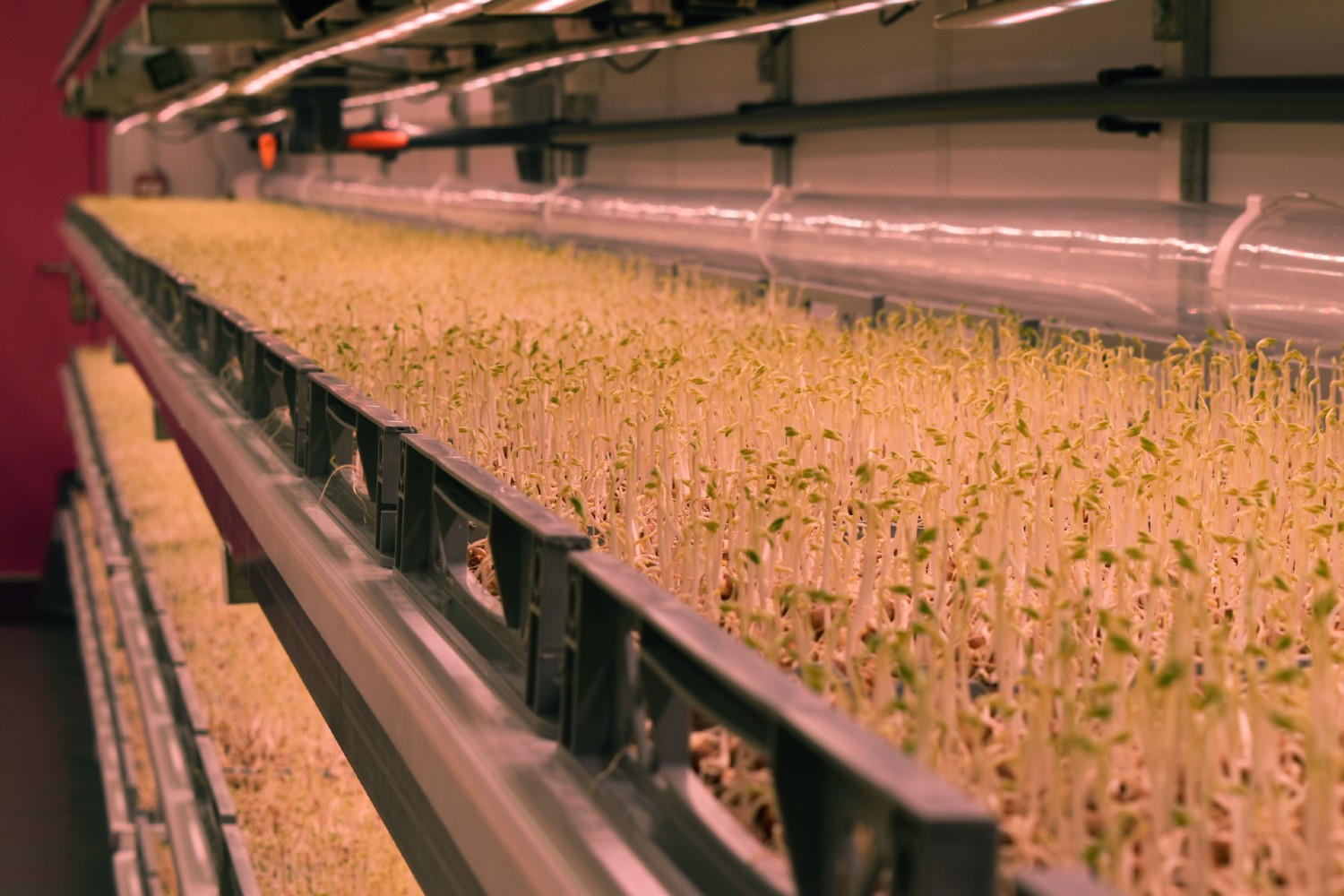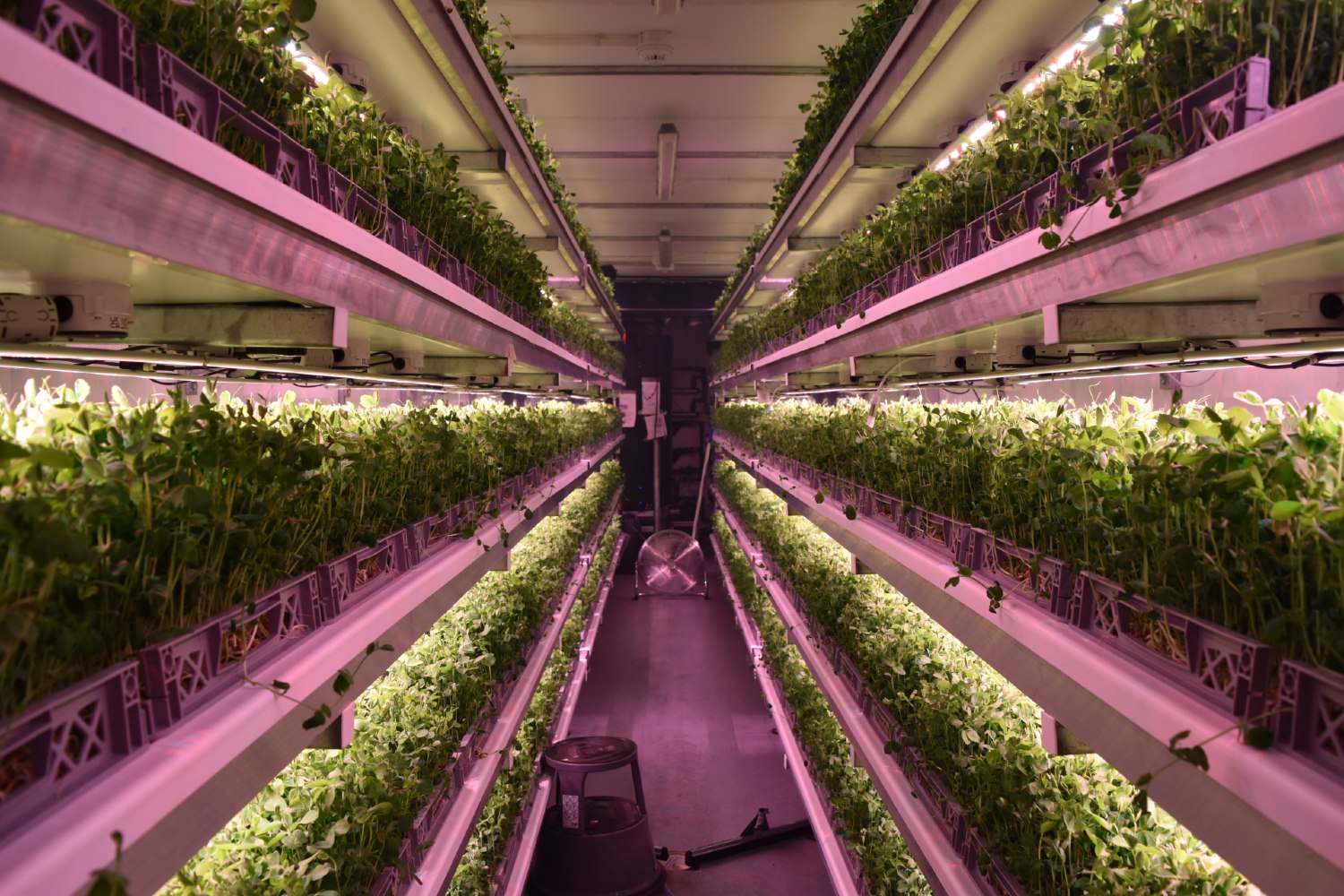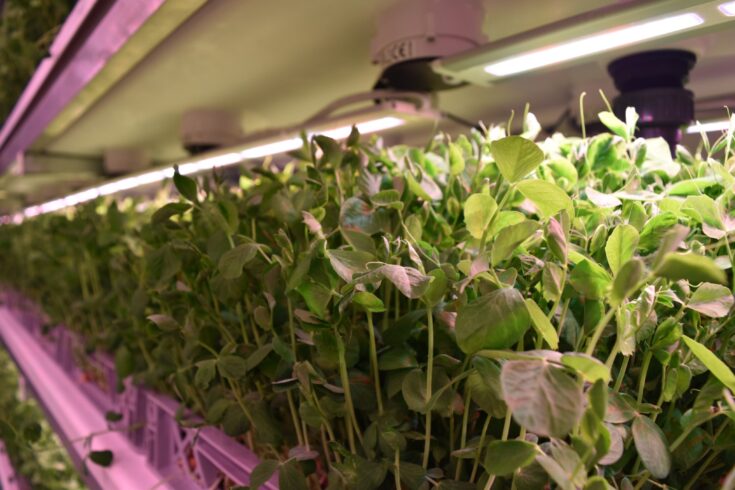A collaboration between JIC, the Quadram Institute Bioscience (QIB), the University of Bristol and industry partner LettUs Grow has developed a commercially viable method to fortify pea shoots with vitamin B12.
Since plants do not naturally contain vitamin B12, plant-based food products often fail to provide adequate amounts of this essential nutrient unless they are fortified.
With the growing trend toward plant-based diets, there is a heightened risk of B12 deficiency in the global population. This contributes to the problem of ‘hidden hunger’, a condition where individuals consume sufficient calories but fail to meet their daily nutrient requirements, leading to deficiencies that can adversely affect health.
A promising solution
Expanding the range of dietary sources for vitamin B12 and other essential nutrients is crucial to addressing nutritional deficiencies and preventing related health issues. Fortifying plant-based foods, such as salads enriched with vitamin B12, offers a promising solution to mitigate these risks.
In this project, pea shoots are fortified with vitamin B12 using a soilless ultrasonic aeroponic system developed by LettUs Grow. This innovative method represents a significant step forward in sustainable and efficient nutrient fortification.
The initiative builds on Professor Martin Warren’s expertise in vitamin B12 research and long-term strategic investment from the Biotechnology and Biological Sciences Research Council (BBSRC) to QIB and JIC.
This collaborative effort highlights how strategic research institutes like JIC and QIB can partner effectively with industry to translate cutting-edge research into practical, impactful solutions that address societal needs in the UK and beyond.
About vitamin B12
Vitamin B12 is one of 13 essential vitamins required by the human body for optimal health. It plays a critical role in red blood cell production, nerve function and DNA replication, making it indispensable for maintaining overall metabolic control.
A deficiency in vitamin B12 can lead to a wide variety of symptoms, including tiredness, shortness of breath and muscle weakness. If left untreated, it may result in more severe health issues such as:
- anaemia
- neurological decline
- impaired immune function
- delayed development in children
Vitamin B12 is naturally produced by bacteria, including those in the digestive systems of animals. Humans typically obtain B12 through their diet by consuming animal-derived products such as meat, milk, cheese, eggs and fish.
However, individuals who do not regularly consume these foods, such as vegetarians and vegans, are at greater risk of B12 deficiency, as nearly all plant-based foods lack sufficient levels of this nutrient.
To maintain adequate B12 levels, these individuals can rely on supplements (ideally taken with a meal for optimal absorption) or fortified foods such as breakfast cereals, which provide an alternative source of this essential vitamin.
Fortified pea shoots
LettUs Grow’s ultrasonic aeroponic technology suspends plant roots in the air, using a fine mist to supply the plant with water, growth nutrients and vitamin B12. This innovative method creates a new dietary plant-based source of B12 without the need for genetic modification, giving consumers more options for including vitamin B12 in their diets.
Increasing the number of products containing B12 could make it easier for consumers to meet their nutritional requirements. Just 15 grams of these fortified pea shoots provide the recommended daily intake of B12 for adults (1.5 micrograms per day).
Pea shoots are an ideal crop for fortification because they:
- are commonly included in salad bags
- grow quickly, being ready to harvest within 10 days of germination
- thrive in indoor farming systems, ensuring year-round availability on store shelves and in restaurants

Aeroponically grown pea shoots at an early stage of growth. Credit: LettUs Grow
Importantly, fortification does not alter a plant’s natural nutritional profile. Pea shoots are high in antioxidants and are a source of vitamins A, C, K, and several B vitamins in addition to B12. Adding fortified pea shoots to your diet not only helps you to meet your B12 requirements but also contributes to achieving your daily intake of other essential vitamins.
The power of academic collaboration
The development of B12 fortified pea shoots is the product of a collaborative effort between several academic institutions.
BBSRC’s Flexible Talent Mobility Accounts (FTMA) fund placements and exchanges, facilitating crucial mobility and knowledge exchange between academic, business, public sector and third-sector organisations.
Dr Bethany Eldridge, during her time at the University of Bristol, was awarded a BBSRC FTMA through JIC. This award facilitated her collaboration with JIC, QIB and LettUs Grow, allowing her to build extensive research expertise, advance her professional development and contribute significantly to the progress of the B12-fortified pea shoot project.
Under the FTMA, Dr Eldridge was able to conduct preliminary research into the use of fortification to enhance the health properties of aeroponically produced salad crops. Her early career was supported by the BBSRC South West Biosciences Doctoral Training Partnership (SWBio DTP). SWBio DTP funded her PhD on plant root traits and soil stabilisation, expertise that made her a strong candidate for the pea shoot project.
Additionally, she received further support from the SWBio DTP through a Doctoral Career Development Fund award.
Advancing initial research
The fortification work built on initial research at the QIB, which demonstrated that leafy greens could be fortified with B12 in ‘kitchen gardens’ using a water nutrient solution (hydroponics).
Dr Eldridge advanced this research by translating the fortification process to aeroponics, a cultivation method that promotes faster plant growth, higher crop yields and healthier plants. Aeroponics also reduces the likelihood of plant and food-borne infections and uses less water, making it a more commercially viable and sustainable alternative to hydroponics.
Dr Eldridge used the FTMA and a subsequent BBSRC Follow-on Fund grant to investigate salad fortification with B12 and to develop and optimise the fortification process. The BBSRC Follow-on Fund supports the translation of fundamental research into practical applications, including commercialisation.
Campus ecosystems: bringing researchers together
Beyond determining how to fortify pea shoots, the researchers also analysed the product to confirm:
- B12 fortification was effective: the active form of vitamin B12 was successfully accumulated in pea shoots, a result made possible by the contributions of Professor Warren’s group
- B12-fortified pea shoots release the vitamin during digestion: simulated digestion assays conducted in collaboration with Dr Cathrina Edwards’ laboratory at QIB validated this finding
- B12 fortification did not affect the shelf life: shelf life assessments performed in collaboration with Professor Kerry Franklin at the University of Bristol demonstrated that fortification had no negative impact on the product’s longevity
The work underscores the strength of the collaboration between JIC and QIB, highlighting the advantages of campus ecosystems like the Norwich Research Park (NRP). Supported by a BBSRC Campus Innovation Award, NRP fosters a culture that promotes multidisciplinary research and enterprise. It also provides the infrastructure and business support necessary to translate innovative bioscience into commercially viable products.
Dr Jonathan Clarke, Head of Business Development at JIC, says:
It was nice to demonstrate the power of NRP. Here, we had multiple institutes side by side. We were just walking across the park and talking to each other about doing this.
The NRP ecosystem fast-tracked the project and built the evidence base for the validity of the B12 fortified pea shoots, yielding a product in which commercial growers could have confidence.
The value of collaborating with industry
LettUs Grow, an aeroponic and vertical farming technology company that provides equipment and support for indoor farming, was a vital industrial partner for the project.
Professor Dodd has worked with LettUs Grow since 2019, using a Royal Society Short Industry Fellowship to strengthen the collaboration. Since then, Professor Dodd and his team at JIC, including BBSRC-funded doctoral students, have collaborated with the company on a range of projects to improve crop performance in vertical farms.
These projects reinforced the relationship between JIC and LettUs Grow, opening the doors for exploratory work to evaluate how LettUs Grow’s unique technology could be applied to improve plant nutrition.
Dr Eldridge’s investigation at LettUs grow during the FTMA showed that pea shoots took up vitamin B12 better than other salads. Fortunately, LettUs Grow had already optimised their system for growing pea shoots.

Trays of pea shoots being grown in an aeroponic vertical farming system. Credit: LettUs Grow
LettUs Grow’s horticulture system allows efficient uptake of B12 from small volumes of nutrient solution. This is especially important given the price of vitamin B12, costing up to £20,000 per kilogram, making it the most expensive nutrient on the market.
Aeroponically fortifying pea shoots with B12 was shown to be not only possible but also cost-effective due to the uptake efficiency and increased yield that comes from aeroponic plant growth.
Commercialising B12 fortified plants
LettUs Grow has provided important business support for the project. They determined that by adding B12 to the crop, the fortified product could be set apart from other aeroponically grown salads on the market, increasing the value and commercial viability of aeroponically grown pea shoots.
Jack Farmer, Head of Research and Development at LettUs Grow, says:
Something that’s really exciting about this project in particular is that it is the first time the enhanced yield potential of aeroponics has been combined with the nutrition enhancement of B12 fortification in a way that can be scaled up to commercial volumes.
This potential to scale the innovation is crucial for accessibility of the end product and getting it out at a level that could hopefully positively impact public health.
Next steps for B12 pea shoots
The Follow-on Fund for the project is ongoing at JIC and QIB, building on developments from the Warren lab to measure and distinguish between B12 types.
This work aims to develop methods for certifying that the aeroponically fortified pea shoots provide the recommended daily allowance of the active form of B12. By building on LettUs Grow’s industrial connections, this development could help bring fortified pea shoots to shop shelves, making them widely available to consumers.
The success of this project highlights the power of knowledge exchange and strong collaboration between academic and industrial collaborators. It demonstrates how such partnerships can rapidly deliver fortified food products with the potential to significantly improve public health in the UK, while also laying the groundwork for future collaborations.
Looking beyond B12
The work on B12 pea shoot fortification is not the only biofortification research underway at JIC. A team led by Professor Janneke Balk is also exploring peas as a potential solution to iron deficiency, a condition that leads to anaemia.
Like B12 deficiency, iron deficiency may become more common as more people adopt plant-based diets. Meat, poultry and fish are rich sources of haem iron, a type of iron that is easily absorbed in the body. In contrast, plant-based sources such as legumes, leafy green vegetables, nuts and seeds provide non-haem iron, which is absorbed less efficiently.
As a result, individuals on plant-based diets need to consume relatively more iron or eat a combination of foods that improve the bioavailability of non-haem iron, or both, to meet their daily requirements.
Professor Balk’s research has identified pea mutants that have more than 10 times higher iron levels. This discovery holds significant promise for commercial applications, including:
- high-iron pea shoots or mangetout
- the development of natural iron supplements
- the potential for gene editing to enhance iron content in other crops
Biofortification is still in its early stages. The BBSRC-funded ‘Biofortification Hub’, based at NRP, is supporting innovation and translational research with industry in biofortification. It recognises the tremendous potential of biofortification as a tool to address nutritional deficiencies and combat ‘hidden hunger’ on a global scale.
Top image: A close-up of mature pea shoots being grown in an aeroponic system. Credit: LettUs Grow

